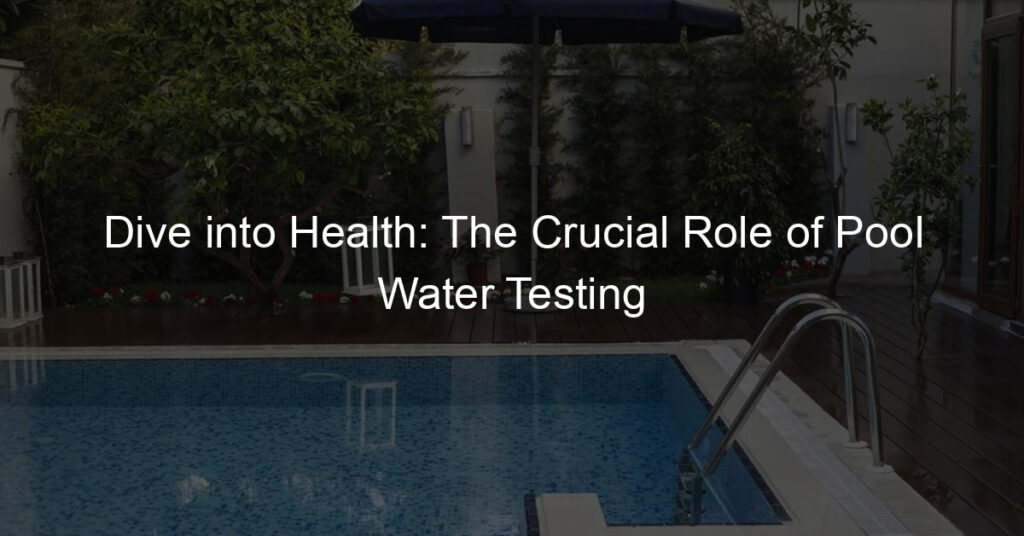Introduction to Pool Water Testing
Swimming pools are a great source of fun and relaxation. However, maintaining a clean and healthy pool requires regular water testing. In this section, we will discuss the concept of pool water testing and its importance.
- Understanding the concept of pool water testing
- The importance of regular pool water testing
Pool water testing is a crucial process that helps to ensure the water in your swimming pool is safe and clean. It involves checking the water for various factors such as pH levels, chlorine levels, and the presence of harmful bacteria. This process helps to maintain the right balance of chemicals in the water, which is essential for the health and safety of those using the pool.
Regular pool water testing is not just about keeping the water looking clear and inviting. It’s about safety and health. Unbalanced pool water can lead to various health issues, including skin and eye irritation, and can even promote the growth of harmful bacteria. Moreover, it can also damage the pool equipment. Therefore, regular testing and adjusting the chemical levels in the pool water is crucial.
Now that we have a basic understanding of what pool water testing is and why it’s important, let’s delve deeper into the science behind pool water chemistry in the next section.
The Science Behind Pool Water Chemistry
Let’s dive into the fascinating world of pool water chemistry. It’s not as complicated as it sounds, and understanding it can help keep your pool safe and enjoyable.
Understanding Pool Water pH Levels
One of the key factors in pool water chemistry is the pH level. But what exactly are pH levels, and why are they so important?
- What are pH levels and why are they important?
- How pH levels affect pool water balance
pH is a measure of how acidic or basic water is. The scale ranges from 0 to 14, with 7 being neutral. Anything below 7 is considered acidic, and anything above is basic or alkaline. For pool water, the ideal pH level is slightly alkaline, between 7.2 and 7.8.
Why is this important? Well, pH levels affect everything from the efficiency of your pool chemicals to the comfort of swimmers. If the pH is too low, it can cause skin and eye irritation and damage pool equipment. If it’s too high, it can lead to cloudy water and scale formation.
The balance of your pool water is crucial for its overall health and safety. And pH plays a big role in this balance. When pH levels are in the correct range, it helps ensure that other chemicals, like chlorine, work effectively to kill bacteria and algae.
But if pH levels are off, it can throw the whole balance off. For example, if the pH is too high, chlorine becomes less effective, which can lead to unsanitary conditions. On the other hand, if the pH is too low, chlorine can become too active, leading to rapid consumption and the need for constant addition of more chlorine.
As you can see, understanding and maintaining the right pH levels is a crucial part of pool water chemistry. It’s not just about keeping the water looking clear and inviting, but also about ensuring a safe and comfortable swimming environment.
Importance of Pool Water Balance
Pool water balance is a crucial aspect of maintaining a healthy swimming environment. It not only ensures the longevity of your pool equipment but also contributes to the overall health and safety of swimmers. Let’s delve into the details of how pool water balance impacts your swimming experience and what happens when it’s not maintained properly.
- How pool water balance contributes to a healthy swimming environment
- Effects of imbalanced pool water
When we talk about pool water balance, we refer to the levels of certain chemicals in the water. These include pH, alkalinity, and calcium hardness. A balanced pool has the right amount of these elements, ensuring that the water is neither too acidic nor too alkaline.
Properly balanced pool water is clear, odorless, and leaves little to no residue on swimmers or pool equipment. It’s also less likely to harbor harmful bacteria or algae, making the pool a safer place for everyone. In addition, balanced water is gentler on the skin and eyes, reducing the risk of irritation or discomfort during and after swimming.
Imbalanced pool water, on the other hand, can lead to a host of problems. If the water becomes too acidic, it can corrode metal equipment, cause skin and eye irritation, and even damage the pool’s surface. Alkaline water can cause scaling on the pool walls and equipment, and can make the water appear cloudy.
Moreover, imbalanced water can provide a breeding ground for bacteria and algae, posing a health risk to swimmers. It can also affect the efficiency of your pool’s sanitation system, making it harder to keep the water clean and safe.
In conclusion, maintaining the right balance of chemicals in your pool water is essential for a healthy and enjoyable swimming experience. Regular testing and adjustment of water balance can help prevent problems and ensure the longevity of your pool and equipment.
Swimming Pool Maintenance: A Comprehensive Guide
Keeping your swimming pool in top-notch condition requires regular maintenance. One of the most crucial steps in this process is pool water adjustment. Let’s delve into this topic in more detail.
Pool Water Adjustment: A Crucial Step in Maintenance
Pool water adjustment is an essential part of maintaining your swimming pool. It involves tweaking the chemical balance of your pool water to ensure it’s safe and comfortable for swimming. Let’s break it down into two main points.
- Understanding the process of pool water adjustment
- Importance of pool adjustment in maintaining water balance
Pool water adjustment is all about maintaining the right balance of chemicals in your pool. This includes chlorine, which keeps the water clean, and pH levels, which should be kept between 7.2 and 7.8 for optimal comfort and safety. If the water is too acidic or too alkaline, it can cause skin irritation and damage the pool equipment. Therefore, testing the water regularly and adjusting the chemicals as needed is crucial.
Proper pool water adjustment is vital for several reasons. First, it ensures the water is safe for swimmers by preventing the growth of harmful bacteria and algae. Second, it helps to prevent damage to your pool equipment and surfaces. Lastly, it contributes to the overall clarity and quality of the pool water, making your swimming experience more enjoyable.
In conclusion, pool water adjustment is a critical part of swimming pool maintenance. By understanding the process and its importance, you can keep your pool in excellent condition and ensure a safe, enjoyable swimming experience for everyone.
Pool Water Sanitation: Keeping Your Pool Germ-Free
Keeping your swimming pool clean and germ-free is crucial for your health and the longevity of your pool. Regular sanitation not only ensures a pleasant swimming experience but also prevents the spread of waterborne diseases. Let’s explore the methods for effective pool water sanitation and understand how regular sanitation contributes to overall pool health.
- Methods for Effective Pool Water Sanitation
- Chlorination: This is the most common method of pool water sanitation. Chlorine effectively kills bacteria and other harmful microorganisms. It’s available in different forms such as tablets, liquid, granules, and gas.
- Bromination: Bromine is another effective sanitizer. It works similarly to chlorine but is more stable at higher temperatures, making it ideal for hot tubs and spas.
- Ultraviolet (UV) Sanitation: UV light can kill bacteria, viruses, and algae. This method is eco-friendly and reduces the need for chemicals.
- Ozonation: Ozone gas is a powerful sanitizer that can kill bacteria and viruses. It also reduces the amount of chlorine needed for sanitation.
- How Regular Sanitation Contributes to Overall Pool Health
- Prevents Disease: Regular sanitation kills harmful bacteria and viruses, preventing the spread of waterborne diseases.
- Improves Water Clarity: Sanitizing your pool regularly helps maintain clear, sparkling water. It prevents the growth of algae and other microorganisms that can make your pool water cloudy.
- Extends Pool Lifespan: Regular sanitation helps maintain the chemical balance of your pool water, preventing damage to your pool’s surfaces and equipment.
- Enhances Swimming Experience: A clean, germ-free pool provides a more enjoyable swimming experience. It also reduces the risk of skin and eye irritation caused by harmful microorganisms.
There are several methods to keep your pool water clean and germ-free. Here are some of the most effective ones:
Regular pool sanitation is crucial for maintaining the overall health of your pool. Here’s why:
In conclusion, regular pool sanitation is not just about keeping your pool looking good. It’s about ensuring the health and safety of everyone who uses the pool. Remember, a clean pool is a healthy pool!
Swimming Pool Water Testing Methods
One of the most important aspects of maintaining a swimming pool is ensuring the water is clean and safe. This involves regular testing of the pool water. There are different methods available for this, and one of the most popular is DIY pool water testing.
DIY Pool Water Testing
DIY pool water testing involves using a kit that you can purchase and use at home. These kits are designed to be user-friendly and provide quick and accurate results.
- Overview of DIY Testing Kits
- Pros and Cons of DIY Pool Water Testing
DIY pool water testing kits typically include test strips or liquid reagents that react with the chemicals in your pool water. You simply dip the test strip into the water or add a few drops of the reagent to a water sample, then compare the color change to a chart included in the kit. This will tell you the levels of various chemicals in your pool, such as chlorine, pH, and alkalinity.
There are several advantages to DIY pool water testing. First, it is generally less expensive than hiring a professional. Second, it allows you to test your pool water as often as you like, giving you more control over your pool’s cleanliness and safety.
However, there are also some disadvantages. DIY testing kits may not be as accurate as professional testing, especially if they are not used correctly. Also, they may not test for all the potential contaminants in your pool water. Therefore, it’s important to use these kits as part of a comprehensive pool maintenance plan, and not as a substitute for professional testing.
Professional Pool Water Testing
While DIY pool water testing can be a handy and cost-effective solution, there are times when professional pool water testing becomes necessary. Let’s explore when and why you should consider professional testing and what to expect from it.
- When and why you should consider professional testing
- What to expect from a professional pool water test
Professional pool water testing is recommended at least once a year, or when you encounter persistent issues with your pool water that DIY testing and treatments can’t resolve. Professionals have access to more sophisticated testing equipment and can detect a wider range of contaminants, including those that typical DIY kits may miss.
Moreover, professional testing is crucial if your pool is frequently used or if it’s a public pool. In such cases, maintaining optimal water balance and hygiene is critical to prevent health issues. A professional test can provide a comprehensive analysis of your pool water, ensuring it’s safe for everyone to use.
A professional pool water test typically involves taking several water samples from different parts of your pool. These samples are then analyzed in a lab for a variety of factors such as pH level, total alkalinity, calcium hardness, chlorine levels, and presence of any harmful bacteria or algae.
Once the testing is complete, you’ll receive a detailed report explaining the results. This report will also include recommendations for any necessary treatments or adjustments to your pool water. Some professionals may even offer to perform these treatments for you.
In conclusion, professional pool water testing is an invaluable tool for maintaining a safe and healthy swimming environment. While it may seem like an added expense, the peace of mind it brings is well worth it.
Case Studies: The Impact of Regular Pool Water Testing
Let’s take a look at two real-life examples that show the importance of regular pool water testing. These case studies will help us understand the impact of regular testing on pool health and the cost of neglecting this crucial task.
- Case study 1: Improving pool health with regular testing
- Case study 2: The cost of neglecting pool water testing
Meet John, a pool owner in California. He was facing issues with his swimming pool’s health. The water was cloudy, and the pool’s walls were turning green. John decided to start testing his pool water regularly. He tested for pH, chlorine, and alkalinity levels every week. After a month, he noticed a significant improvement. The water was clear, and the greenish color on the walls had disappeared. His pool’s health had improved drastically. This case study shows how regular pool water testing can help maintain a healthy swimming pool.
Now, let’s talk about Sarah, a pool owner in Florida. She neglected the importance of pool water testing. Over time, her pool started showing signs of poor health. The water became murky, and the pool’s walls developed algae. Eventually, she had to hire a professional pool cleaning service, which cost her a significant amount. This case study demonstrates the cost of neglecting regular pool water testing. It not only affects the pool’s health but also leads to additional expenses.
These case studies highlight the importance of regular pool water testing. It’s not just about maintaining the aesthetic appeal of your pool. Regular testing ensures the health of your pool, preventing unnecessary expenses in the long run.
Conclusion: The Lifesaving Importance of Pool Water Testing
In this article, we have explored the critical role that pool water testing plays in maintaining a safe and healthy swimming environment. As we conclude, let’s recap the key points and share some final thoughts on the importance of maintaining pool water balance and chemistry.
- Recap of the importance of pool water testing
- Final thoughts on maintaining pool water balance and chemistry
Pool water testing is not just about keeping the water clear and inviting; it’s about safeguarding the health and wellbeing of everyone who uses the pool. Regular testing helps prevent the growth of harmful bacteria and algae, which can lead to skin, eye, and ear infections. It also helps maintain the right balance of chemicals in the water, preventing damage to the pool equipment and surfaces.
Moreover, we’ve seen through various case studies how regular pool water testing can even save lives. For instance, by preventing the spread of waterborne diseases and reducing the risk of chemical burns or poisoning from improperly balanced pool water.
Maintaining the right balance and chemistry in your pool water is a continuous process. It requires regular testing and adjustment of the water’s chemical levels. This includes the pH, alkalinity, and chlorine levels, among others.
Remember, each element in your pool water interacts with the others, affecting the overall water balance. Therefore, it’s crucial to understand the science behind pool water chemistry and use the right testing methods to ensure accurate results.
By doing so, you not only create a pleasant swimming environment but also contribute to the safety and health of all pool users. So, let’s make pool water testing a priority and enjoy the benefits of a clean, safe, and healthy pool.














